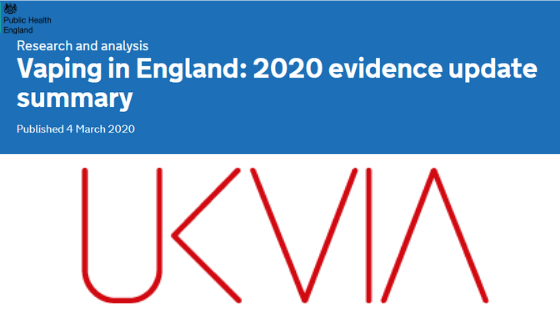The UK Vaping Industry Association (UKVIA), the largest trade body representing the vaping sector in the UK, today calls for the wave of misinformation over vaping to stop, given the latest findings in Public Health England’s “Vaping in England: 2020 Evidence Update Summary” which reveals that “false fears” are preventing smokers from quitting by taking up vaping – something that the UKVIA has consistently argued.
The PHE report also highlights that more former smokers have made the switch from cigarettes to vaping products, despite such false fears and that youth uptake remains relatively small scale.
The key findings of the review include:
- Perceptions of harm from vaping among smokers are increasingly incorrect and out of line with the evidence. The proportion of those who thought vaping was less harmful than cigarettes declined from 45% in 2014 to 34% in 2019. These misperceptions are particularly common among smokers who do not vape.
- Current vaping prevalence among former smokers has continued to rise and was 12% to 13% in 2019.
- Vaping remains most common among smokers and former smokers, with less than 1% of people who have never smoked currently vaping.
- The proportion of current smokers who have not tried vaping products remained at 37% between 2018 and 2019.
- Smoking among adults in England has continued to decline over the past 10 years and in 2019 was around 15%.
- Most adults use vaping products to help them quit smoking.
- Vapers said that banning flavoured liquids would deter them from using vaping products to help them quit or reduce their smoking. It could also push current vapers towards illicit products.
- When a vaping product is used in a quit attempt, either alone or with licensed medication, success rates are comparable to, if not higher than, licensed medication alone.
- Less than 1% of young people who have never smoked are current vapers.
- There is a lack of evidence on the prevalence of vaping in pregnancy in England, the effects of vaping on smoking during pregnancy and following childbirth, and on the effects of vaping on maternal health or pregnancy outcomes
John Dunne, Director of the UKVIA, said: “This provides further and concrete evidence that vaping has a crucial role to play in changing the lives of smokers around the country and it dispels the myths that youth vaping is currently a major issue.
“However, it also tells us that the gross misinformation that has been spread about the safety of vaping has had an effect on consumers’ perceptions of e-cigarettes which could greatly influence their decision to switch from smoking which carries significantly more health risk.
“We welcome the fact that PHE went as far to highlight that vaping, as we know it, should not be confused with cannabis vaping or vaping of other illicit substances and restated that the recent deaths in the US, which has significantly affected the vaping industry in the UK, appeared to be caused by vaping the cannabis derivative THC oil and vitamin E acetate.
“It is crucial that we put a stop to all of the misinformation on vaping out there. As PHE concluded in their review, increasingly incorrect perceptions among the public about the harms of vaping could prevent some smokers using vaping products to quit smoking. The fact, as highlighted in their report, that the proportion of current smokers who have not tried vaping products has remained at 37%, supports this view.”
The review was PHE’s sixth independent e-cigarette report, commissioned from researchers at King’s College London.

